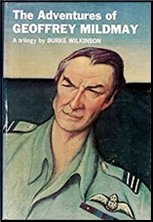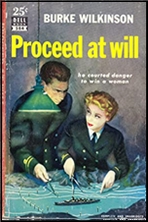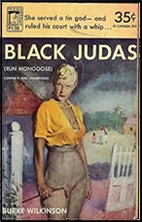Thu 4 Feb 2021
Reviewed by David Vineyard: BURKE WILKINSON – The Adventures of Geoffrey Mildmay, V.C.: A Trilogy.
Posted by Steve under Reviews[6] Comments

BURKE WILKINSON – The Adventures of Geoffrey Mildmay, V.C.: A Trilogy. Robert B. Luce, hardcover, 1977. Consisting of: (1) Proceed at Will (Little Brown, hardcover, 1948); (2) Run, Mongoose (Little Brown, hardcover, 1950; Permabook, paperback, as Black Judas); and Last Clear Chance (Little Brown, hardcover, 1954).
The Second World War brought a harvest of heroes — and great villains too…but the story of one man is still worth telling — a man who wore the cloak of courage with more skill and dash than any I have ever known.

Proceed at Will, the first adventure of Geoffrey Mildmay begins with that Stevensonian announcement about the nature of heroism. The war is over and American officer Bill Stacy is seconded to Admiralty intelligence to go to France and find his friend Commander Geoffrey Mildmay who disappeared after being sent to sink the German battleship Prinz von Blucher in Brittany.
Bill is Mildmay’s closest friend, and enemy, because as the novel describes their friendship is fraught with Mildmay’s mercurial nature. His courage is never in question, but his loyalty is another matter.
During the war Bill had been chosen to work on a British project to train Mildmay to pilot a midget sub and sink the von Blucher. Intelligence was concerned about Mildmay’s ties to a group who had questionable loyalty and his nature made those questions vital to answer.
As always with the man, nothing is ever simple black and white. When Bill helps uncover a fifth columnist plot Mildmay claims he was working with British intelligence all along, and Bill can’t be sure he isn’t telling the truth. He can’t put it past war time spying to send two men at odds to accomplish a mission. Perhaps he was only there to provide Mildmay cover with the traitors, or perhaps Mildmay briefly flirted with the exciting role of double agent.
Either is within Mildmay’s nature.
A woman Bill loves that Mildmay breaks him up with complicates things, and even when he finds Mildmay in France the question arises did he really sink the ship and decide to stay in France to fight on, or is he lying and did the Resistance sink the von Blucher? The novel ends with some answers, if Bill can trust them.

That is the opening line of Run, Mongoose, the second of the Mildmay novels that finds Bill, after a tragic romance, joining Mildmay in Ireland and finding his friend restless and in a dangerous mood (…hero, adventurer by profession, romantic by inclination, pro patria when it suited his own wayward will, but always pro Mildmay.)
It seems Mildmay has fallen under the spell of wealthy Sir Gabriel Gregorious, a colorful Jamaican millionaire (and precursor to many an Ian Fleming villain) who has hired Mildmay for a scheme involving his bauxite mining interests in Jamaica as well as purchasing a German U-boat and hiring its captain to pilot it to the island, plus there is beautiful Lady Felicity Bantry a sexy and dangerous Irish peer.
Again Bill finds himself in the role of spy and wondering if Mildmay can be trusted. Which way will the pendulum swing when it comes to treason if the gamble is exciting enough.
The ending as Mildmay lies seriously wounded and they wonder if help is coming is as close to a confession as Mildmay makes, and Bill finally concludes that “Geoffrey true or Geoffrey false, Geoffrey adventurer or Geoffrey agent, the world would be a poorer place without him. Some gallantry would go, and some gayety — and gallantry and gayety can ill be spared …â€
The final book, The Last Clear Chance takes its title from the legal concept of the last clear chance when a person can be involved in a potential felony and still avoid prosecution. Mildmay is in Washington D.C., supposedly with the British legation, and Bill Stacy is once again drawn into his schemes.

A traitor lies at the heart of the American government and there is a plot to kidnap an American statesman by the Soviets, just the kind of audacious action a man like Mildmay would find a challenge, and it is not until a dark night on the Chesapeake waiting for a Soviet submarine that Bill Stacy finally knows which side Geoffrey Mildmay will come down on.
It seems at the end of the book Mildmay has found peace and romantic commitment, but in a rather Bondian moment all he can tell the woman he loves is “For here and now I am with you.â€
One critic called the Mildmay books a mettlesome blend of John Buchan and Evelyn Waugh, and that sums them up well. No few adventure writers followed the War with heroes of dubious nature and motive, including Hammond Innes, Victor Canning, and Geoffrey Household in part a reaction to real events and in part to the patriotic fervor of the War and the complexity of the world it saved.
The trope goes back to Stevenson and complex good/bad men like Long John Silver, Alan Breck Stewart, and Harry Northmour (“Pavillion on the Linksâ€) and was also a reaction to the pre-war eras uncomplicated popular fiction.
By the end of the war the more jaded view of Eric Ambler, Graham Greene, and even popular writers like Peter Cheyney, Dennis Wheatley, and soon Ian Fleming had changed the simple clear cut heroics of an earlier period to something darker and more complex.
Geoffrey Mildmay stands a bit more than halfway between the uncomplicated heroes of John Buchan, Dornford Yates, and H. C. McNeile and Peter Cheyney’s tough agents and James Bond (his final adventure ironically the same year Bond debuted).
Burke Wilkinson was a busy man who still found time to write well received fiction and history. Among his other positions was Deputy Assistant Secretary of State for Public Affairs and adviser to the Supreme Allied Commander in Europe involved with NATO. He also served two tours in the Navy during the war and was a Commander in the Naval Reserve. His last novel Night of the Short Knives was reprinted in paperback and had good sales and featured an American assigned to SHAEF uncovering a Soviet plot. It was optioned for one of those films that never got made.
The three Mildmay adventures were reprinted by a small press in 1977 in a thick omnibus edition late in the wake of the Bond craze. I stumbled on my own copy in a Doubleday Book Store in the old Dallas North Park shopping mall and happily forked over my $7.95 for the omnibus. I even recall what I bought with it, three Karl May paperbacks from Bantam Books, Winnetou, Adjistan and Djistan, and In the Desert. Between the four of them it was close onto 2000 pages of adventure.
That was January 1970, fifty one years ago to the month. (*)
Days like that are what make book collecting rewarding. You would be hard put today to get half as much for under $20 or recall a week later the transaction.
___
(*) Editorial Note: Apologies for the short delay in posting this review!
February 4th, 2021 at 5:47 pm
A series new to me, but not to the gent who runs the Spy Guys and Gals website:
https://spyguysandgals.com/sgShowChar.aspx?id=902
In some matters it seems as though I am the last to know.
February 4th, 2021 at 8:40 pm
I could swear the plot in the first of the trilogy was adapted to radio as an episode of ‘Escape!’. Probably with Ben Wright?
February 4th, 2021 at 10:47 pm
It doesn’t ring any bells with me, but I’ve only listened to maybe a third of the ESCAPE shows. Nor does Ben Wright being in it, if so, narrow it down any!
February 5th, 2021 at 9:49 pm
It’s within the realms of possibility the story was adapted, but the theme of the hero who might not be exactly who he is supposed to be was a popular post war one that continues. I can think of a few dozen films and books with similar plots by a variety of post war writers and no few movies, and as you say Wright is ubiquitous enough as an actor on radio to be hard to pin down.
February 5th, 2021 at 10:28 pm
Strangely enough, although I started collecting old paperbacks some 50 years ago, I can’t recall ever seeing the Dell edition of the first one.
The second one I’m sure I’ve seen, but there’s nothing on the cover that would have induced me to even pick it up and look inside.
February 13th, 2021 at 11:34 pm
Though he is a bit more romantic, and far less dull, the character of Mildmay is an interesting precursor to James Bond. Like Bond he falls into that Not Quite a Gentleman category, something Americans to this day miss about Bond — that he is an outsider, good enough to do the dirty work for his country, but not good enough to belong to M’s club, too tan, too interested in fast cars, too interested in women to ever be part of the establishment he represents.
That separation of the Secret Service hero in England from the society he defends runs through most Post War spy fiction. Bond, Harry Palmer, Johnny Fedora, Mildmay, none is quite good enough, quite a gentleman, and their creators are aware of an exploit that.
Bulldog Drummond barely tolerated semi pro Ronald Standish, he might put up with Bond, but he woud find him an awful cad and bounder. Dornford Yates Jonathan Mansel might well have taken a horeswhip to him, not that he would have survived trying.
Most Americans look at a Bond or a John Steed and see the exact opposite of what the British audience saw, pretenders to the rainment of English gentleman.